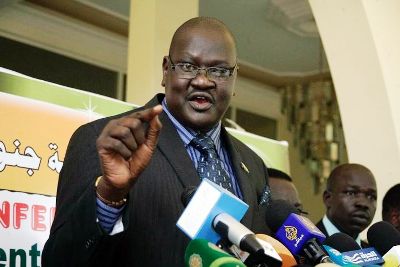S. Sudanese presidency refutes “lack of democracy” claims
August 28, 2014 (JUBA) – The South Sudanese presidency has dismissed as “untrue” claims by sections of its citizens that lack of democracy forced many to flee the nation.

Ateny, himself a former government critic prior to his recent appointment, said freedom of speech has a limits around which people should not cross to affect others.
“You know I was critical commentator but I was always exhibiting objectivity, knowing where I would step on the toes of other people if I cross the limit. That was why I never got in trouble with authorities because I knew what I was doing,” he said.
The presidential aide was reacting to views expressed by some South Sudanese living in Uganda, majority of who claimed South Sudan was not democratic and thus forcing them to flee it.
John Baak, native of Warrap state separately said in an interview that the cause of fighting was not due to lack of democracy, but rather a fight over political positions.
“In the transitional constitution, there are all these rights. It mention the right of handicapped, it mentions right of minorities, religion much better than Khartoum. There are human right clauses that many eastern European countries had adopted in the constitution after the fall of communism. You know that I had the opportunity to live in Russia and Ukraine. Because of this background, I personally abuse any woman and come up with an excuse that this is my culture and you cannot intervene,” said Baak.
“The problem is how we interpret these rights,” he added.
Alphonse Madut, a native of Western Bahr el Ghazal state described South Sudan’s democracy as “a sham”, stressing that even those in the government knew the country was in “a mess”.
“The democracy we talk about in South Sudan is a sham and I strong believe that even those in the government know the country is in a total mess, no matter how much it is pumped by the elites who run the country, who control the nation’s news media. South Sudan, in other words, is basically a democratic country in theory but practically undemocratic. This is a fact,” he said.
Madut cited recent act of government agents in which they arbitrarily closed down the catholic-owned Bakhita FM radio in Juba for broadcasting reports on clashes between rebels and government forces.
“If you cannot tolerate the views expressed by others, then you cannot claim being a democrat. It cannot be both ways. To be intolerable with others and at the same time claim to be a democrat. No. It is the other way round, show of tolerance,” he said.
(ST)
